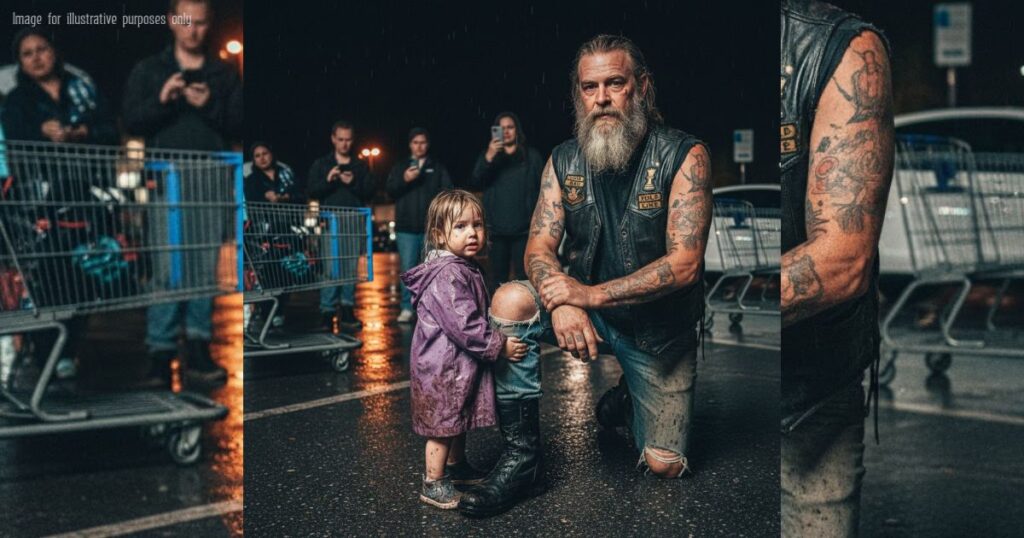I was loading bungee cords when a kid in a purple raincoat ran out of the dark and wrapped both arms around my boot.
Walmart parking lot. Midnight drizzle. Sodium lights humming.
She wouldn’t let go.
“Please— I’m so sorry,” her mother panted, soaked, breath fogging. “She— she doesn’t talk— she hasn’t— I can’t—”
Phones came up like periscopes.
I heard the familiar hiss: “Got it on video.”
The girl slid down my boot and latched onto my leather pant leg with both hands. Knuckles white. Cheek against the wet hide like it was a life raft. Every time her mom tried to peel one finger back, the kid trembled harder.
I’m sixty-six. Name’s Rook. The patch is a chess piece because I spent half my life on power lines in storms— holding steady while the wind tried to buck me into cornfields. “Hold the line,” we used to say. It stuck.
That coin on my vest? A nickel-sized disc of dull brass. HOLD THE LINE stamped dead center. Habit made me rub it with my thumb when thunder started. Habit made me rub it now.
The girl’s eyes tracked my hand. Not my face, not my beard, not the scar running ear to jaw. Her gaze locked to the coin like a magnet.
Her lips parted. Dry. Cracked.
And for the first time in months, her voice pushed through.
“Dad… said find Rook.”
Her mother went very still. Like a deer who finally understands the shape in the trees isn’t a stump.
“He told me,” the girl whispered, words coming in small, careful squares, “Rook keeps the line.”
Someone’s phone lowered. Another stopped recording. The rain kept at it, tapping the asphalt in tiny drums.
I crouched slow. Old knees. “Hey, kiddo.”
She tapped the coin with one finger. Tap. Tap. Tap. Three beats.
Then she stood on the white parking stripe and held her breath—like the paint itself was a rope and she was afraid to slip.
“Do you have a name?” I asked.
Her mother swallowed. “Maya.”
I nodded. “Maya, that stripe you’re standing on? That’s a good stripe. We can share it if you want. You and me. No one crosses it unless you say.”
Maya’s breath came out in a tiny cloud. She didn’t answer. But she didn’t let go.
Her mother wiped rain from her face with the back of her hand. “She hasn’t spoken since… since we lost her dad. Five months. She reads symbols better than faces. He— he used to show her pictures. Of your patch. Said if anything ever happened, find the rook.”
Blue.
That’s what we called him. Not because he was sad—though sometimes the road puts a weight in a man—but because he ran routes in a cobalt van and wore the same faded hoodie every winter. He’d hauled cases of bottled water to our toy ride when nobody else could. Quiet man. Good back. Slow smile. He’d pressed this coin into my palm at a truck stop off I-90 and said, “If I ever drop the rope, you hold it for me.”
He’d dropped it on a Tuesday. Another driver drifted lanes and turned four lanes into a junkyard. Reckless. Bloody sirens. A headline that shrank into the pile with all the other headlines.
I looked at Maya. Then at her mother. “You’re Reyna.”
She blinked. “How did you—”
“He told me once. Said you were the better half.”
The phones were still out there, but farther away now, sheepish in their little red dots. A man in a windbreaker started to say something and thought better of it. The rain softened. The lights buzzed.
I rested my palm open between me and Maya. Not touching. Never touching first. The coin lay dull and steady.
“This is yours now,” I said.
Maya stared. Her shoulders dropped a quarter inch. She touched the edge with a nail, like a bird testing a twig. Then she laid her hand over mine and the coin both, as solemn as a pledge.
Reyna folded in on herself. “I’ve tried everything,” she whispered. “Lists. Schedules. Doctors. There’s a months-long wait. Rent jumped. I work nights and mornings. She hides in closets when I leave. And now this— I thought she was running toward the store. She ran to you.”
“Maybe she ran to the line,” I said, nodding at the white paint. “Maybe she ran to something that doesn’t move when the world does.”
A headlight beam washed over us.
Two bikes ghosted in and cut their engines.
Then two more.
Word moves quick in our town—especially when it rains.
Doc slid off his seat with a first-aid kit he keeps for humans and hearts. Bishop came in a black hoodie that said LOVE YOUR NEIGHBOR in big block letters. Switch carried a toolbox like it was part of his arm. Cricket—who can weave a Road King through traffic cones with her eyes closed—flipped her kickstand and took a breath that meant business.
No swagger. No show. Just boots in a circle that left space for a girl on a stripe.
“Let’s give her room,” Bishop said, calm as gravel. To the lingering phones: “Maybe point those somewhere helpful. Like the sky. We might scare off the rain.”
He always talks like that. It works.
Doc knelt next to me. “Hey, Maya. I’ve got earplugs. They’re soft like little pillows. Can I leave them on the ground for you?”
She nodded. Tiny. He set them down and backed away. She accepted them like ceremonial stones and tucked them in. The hum of lights dulled. Her shoulders dropped another quarter inch.
“Tell me what you need,” I said to Reyna.
She laughed a sound that tried to be laughter and failed. “A time machine? Rent. A car that starts before the third prayer. Somebody to sit with her while I’m at work who isn’t a stranger she’ll be afraid of. And about six hours of quiet sleep.”


